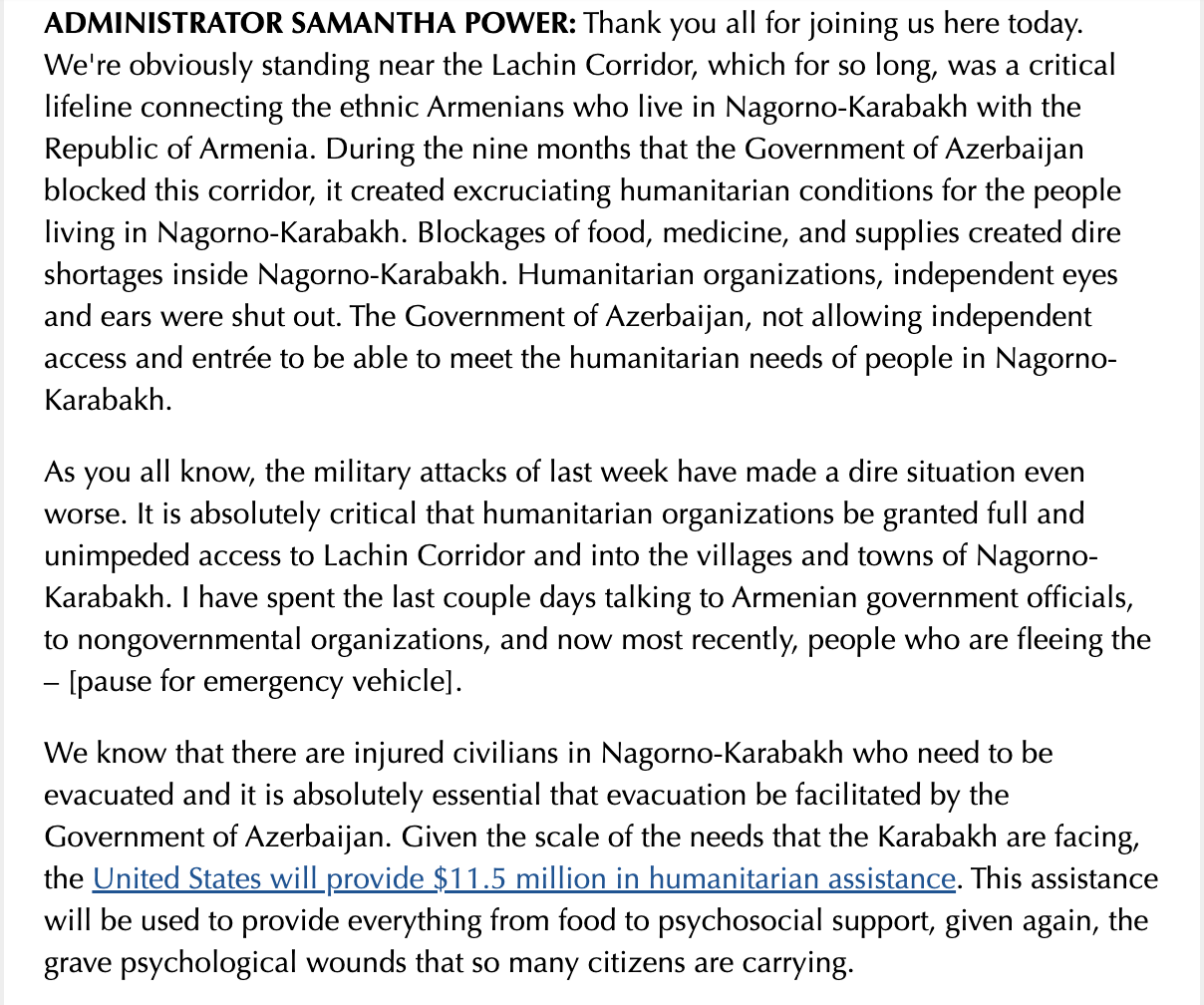It’s another big week in foreign affairs news. Senator Bob Menendez, the influential chairman of the Senate Foreign Relations Committee (now former chairman because he had to stop down from his role leading the committee), was indicted, together with his Armenian-American wife Nadine, for allegedly accepting hundreds of thousands of dollars in bribes, including gold bars, and allegedly getting sucked into an Egyptian foreign influence operation. You can read the indictment here. It’s wild.
Menendez maintains his innocence. But the fallout from the scandal, including who is and isn’t calling for Menedez to resign from Congress, took up a lot of mental energy on Capitol Hill this week.
Longtime Senator Dianne Feinstein died on Friday at the age of 90. She cast her last vote on Thursday morning. She was the first woman to serve as mayor of San Francisco and the first woman elected to the U.S. Senate to represent California.
The House of Representatives voted in favor of $300 million in Ukraine aid on Thursday evening after much back and forth about whether it would be included in appropriations bills (it wasn’t).
But don’t get too excited. The House and the Senate passed a short-term continuing resolution late on Saturday that will fund the government until November 17, narrowly averting a shutdown. But it didn’t include any money for Ukraine.
Senators immediately said that Ukraine is next on their agenda. “The U.S. does not abandon its allies, and the U.S. will not give Putin a free pass to continue his brutal war of aggression,” Senator Patty Murphy said in a statement.
It was a historic week in Eurasia. Azerbaijan appears to have completely taken over the ethnic Armenian enclave of Nagorno Karabakh. At least 50,000 people have fled the region, almost half the population, and many say they don’t expect to return home.
Control of the region has been a point of contention and caused several armed conflicts since the fall of the Soviet Union. Now, with Russia distracted in Ukraine and unable to mediate, Azerbaijan may have ended one of the region’s frozen conflicts by driving all of the local inhabitants from their homes.
But it’s not all over yet. The recent events only laid the groundwork for more conflict between Azerbaijan and Armenia. Baku now wants to create a land corridor through Armenian territory to the Nakhchivan Autonomous Republic, an Azerbaijani exclave on the border with Turkey.
There are also ongoing disagreements about the demarcation of the Armenia-Azerbaijan border. Some international observers, fearing further conflict, are already calling for negotiations on these points.

Events this week also kicked off in the Balkans after a group of around 30 heavily armed Serbs barricaded themselves in an Orthodox monastery in northern Kosovo and entered into a daylong gunbattle with Kosovo’s police force.
Here’s a fascinating nugget from Dimitar Bechev’s writeup of the showdown for Carnegie Europe, who notes that a leader of one of the main Serbian political parties in northern Kosovo was present in the monastery during the gunfight:
The Kosovo authorities look into the role of Milan Radojičić, the deputy chair of the dominant Serb party in the north, Srpska lista (Serbian list). He was there during the standoff—Kosovars released video footage which proved that, while [Kosovo’s Prime Minister Albin] Kurti called for a tough line on Srpska lista. But then Radojičić miraculously disappeared from the monastery, along with most of the thirty gunmen. There is speculation that the withdrawal was negotiated, with the U.S. embassies mediating between the Kosovo forces of order and the heavily armed Serbian contingent.
All this is to say that it has not been a dull week. There’s more information about all of these stories below. I hope you’re having a relaxing Sunday. Xx Cristina
What I’m writing:
• With the U.S. government expected to shut down after Sept. 30, new refugees arriving from Ukraine will no longer have access to healthcare, food assistance, or other social services. Some have postponed their relocation to the U.S. as a result. This story is unlocked and free to read.
• My colleague Phillip Athey and I wrote a piece on Elon Musk’s deals with the Pentagon and why Congress is worried about the U.S. relationship with such a mercurial figure who has some questionable foreign policy positions and isn’t afraid to act unilaterally. This story is unlocked and free to read.
My weekly news blurbs:
What I’m reading:

• Daily Passport has a fun look at the history of the Catacombs of Paris.
• Russian forces tortured Ukrainians to death, Erik Møse, Chair of the Commission of Inquiry on Ukraine, told the United Nations Human Rights Council. Reuters has the story.
• Russia is seeking to rejoin the United Nations Human Rights Council after being expelled because its forces invaded Ukraine, the BBC reports.
• Russian President Vladimir Putin appointed a former senior Wagner commander to lead Russian militia operations in Ukraine, a first indication of how the Kremlin seeks to repurpose the notorious paramilitary group a month after its founder died in a plane crash, the Financial Times reports.
• The Ukrainian military claimed a strike killed thirty-four Russian officers, including the Black Sea Fleet commander, Admiral Viktor Sokolov. The New York Times has the story. Russia has denied that Sokolov is dead.
• Poland clarified that it would send weapons it has already committed to Ukraine after Polish Prime Minister Mateusz Morawiecki said, “We no longer transfer weapons to Ukraine because we are now arming Poland,” CNN reports.
• The United States offered Poland a $2 billion loan to help modernize its military, the Associated Press reports. $60 million of U.S. Foreign Military Financing will subsidize the loan’s cost so that Poland can undertake “urgent procurements of defense articles and services from the United States.”
• The German government will impose checks on the border with Poland and the Czech Republic to stem an influx of asylum seekers, Politico Europe reports.
• Polish Prime Minister Mateusz Morawiecki announced new vehicle searches at Poland’s border with Slovakia “where there is suspicion that there are illegal immigrants,” DW reports.
• Poland's foreign ministry is in the midst of a visa-for-money scandal. The deputy foreign minister resigned, and seven other officials have been indicted. NPR has an explainer.
• Poland’s ruling Law and Justice (PiS) party has launched a vitriolic campaign against acclaimed director Agnieszka Holland for making a harrowing film that centers on how Poland handles — and maltreats — migrants trying to cross its border with Belarus, Politico Europe reports.
• Over 50,000 ethnic Armenians from Nagorno-Karabakh, or half the population, crossed into Armenia as fears of violence or persecution grew and the risk of a mass exodus increased, the BBC reports. Secretary of State Antony Blinken called on Azerbaijan to “protect civilians and uphold its obligations to respect the human rights and fundamental freedoms of the residents of Nagorno-Karabakh.”
• Azerbaijan arrested the former head of Nagorno-Karabakh’s separatist government, Ruden Vardanyan, as he tried to flee into neighboring Armenia along with tens of thousands of others who fled the region following Azerbaijan’s military operation, Al Jazeera reports.
• Nagorno-Karabakh Armenians are facing life in exile, as thousands seek to leave after Azerbaijan launched a lightning attack into the ethnic Armenian territory, Politico Europe reports.
• Nagorno-Karabakh’s ethnic Armenian separatist government said it would dissolve itself by the end of the year, separatist President Samvel Shakhramanyan decreed. The Associated Press has the story.
• At least 200 people were wounded following an explosion at “the largest” fuel depot in the Nagorno-Karabakh region, the New York Times reports. Politico Europe reported that at least 68 people died in the blast.
• Tensions between Serbia and Kosovo flared anew when some 30 heavily armed Serbs barricaded themselves in an Orthodox monastery in northern Kosovo, setting off a daylong gunbattle with police that left one officer and three attackers dead, the Associated Press reports.
• Balkan Insight has a report from the North of Kosovo following the incident between a group of heavily armed local Serbs and Kosovo police. Kosovo’s leaders described the events as a terrorist attack and blamed Serbia for seeking to destabilize their country.
• Serbia’s president demanded that a NATO-led peacekeeping force take over for national law enforcement in northern Kosovo after a daylong shootout between armed Serbs and Kosovar police, the Associated Press reports.
• Kosovo called on Serbia to hand over ethnic Serb gunmen it said had escaped after a shootout with Kosovar police, Reuters reports.
• Kosovo’s interior minister accused Serbia of direct involvement in the clashes and was investigating the possibility of Russian involvement, the Associated Press reports.
• Kosovan authorities say they recovered a large cache of arms after ethnic Serb gunmen stormed a village in the north, the Guardian reports.
• The United States called on Belgrade to pull its forces back from the border with Kosovo on Friday after detecting what it called an unprecedented Serbian military buildup, Voice of America reported.
• Slovakia, a NATO member, may soon have a pro-Russia prime minister, CNN reports. Former Prime Minister Robert Fico, who has blamed “Ukrainian Nazis and fascists” for provoking Russia’s invasion, is leading the polls. Only 40% of Slovaks believed Russia was responsible for the war in Ukraine, according to a survey by GlobSec.
• Prime Minister Viktor Orbán told the Hungarian parliament that there was no urgency to ratify Sweden’s NATO bid, Reuters reports.
• Turkish President Recep Tayyip Erdoğan said Turkey would ratify Sweden’s NATO accession if the United States went ahead with a sale of F-16 fighter jets to Turkey, the New York Times reports.
• In Spain, supporters of the conservative People's Party marched against reports that acting Prime Minister Pedro Sánchez could offer amnesty to Catalan separatists in exchange for support for him to stay on as prime minister, DW reports.
• Spanish center-right opposition leader Alberto Núñez Feijóo criticized acting Prime Minister Pedro Sánchez for considering an amnesty for Catalan separatists as lawmakers prepared for a vote expected to confirm that the conservatives are unable to form a government, the Financial Times reports.
• Germany banned a second far-right extremist group, the New York Times reports. The two banned organizations are Artgemeinschaft and the Hammerskins. The ongoing crackdown comes ten months after authorities foiled a far-right plot to overthrow the democratic government.
• The assassination of Sikh community leader Hardeep Singh Nijjar in Canada was a larger and more complex operation than previously reported, according to the Washington Post.
• Facebook allowed the Indian military to spread propaganda and disinformation about its actions in Kashmir out of fear of antagonizing the government and facing possible treason charges, the Washington Post reports.
• Landmark diplomatic trips are underway following positive Saudi and Israeli efforts to normalize relations, the BBC reports.
• Sudan’s army is ready to begin peace talks with the rival Rapid Support Forces, General Abdel Fattah al-Burhan said. The two factions began fighting in April, and at least 5,000 people have died, and over five million have been displaced since then, the BBC reports.
• The United States paused specific foreign assistance programs in Gabon after last month’s coup, Reuters reports.
• Mali’s elections, scheduled for February, were postponed due to “technical reasons,” the military junta announced. Al Jazeera has the story.
• The military junta in Burkino Faso thwarted an attempted coup by security and intelligence services, Reuters reports.
• The Kenyan government announced it will deploy a police force to Haiti by January 2024 to restore order amid the ongoing gang warfare, the BBC reports.
• The BBC has a report on the shadowy Chinese firms that own chunks of Cambodia.
• Senator Robert Menendez, the chairman of the Senate Armed Services Committee, secretly assisted Egypt in lobbying for the release of funds and helped it secure weapons sales in exchange for cash, checks, and gold, according to a federal indictment. The New York Times has the story.
• The United States recognized the Cook Islands and Niue as “sovereign and independent” states, as U.S. President Joe Biden bolsters ties to Pacific Island nations as part of a push to counter growing Chinese influence, Al Jazeera reports.
Interesting statements:
You can write to me for any reason: c.maza@protonmail.com










Society is a fragile thing and the US (with all its many flaws) has been a great supporter of civilization.
When the isolationists have their way, evil spreads.
And evil is both corrosive and expansionist.
I would rather fight evil in Ukraine and Kosovo than fight it in the US.